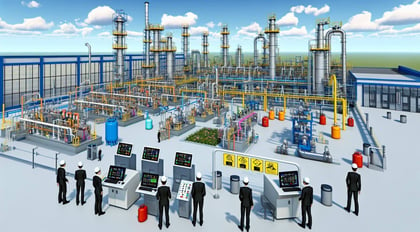Maximizing Adaptive and Responsive Production
In the realm of chemical manufacturing, staying competitive requires a delicate balance between efficiency and adaptability. Production schedulers play a pivotal role in orchestrating this balance, ensuring that operations run smoothly while responding promptly to evolving market demands.
In this blog, we look into manufacturing strategies that emphasize adaptability and responsiveness, highlighting the integration of PlanetTogether with leading ERP, SCM, and MES systems as a cornerstone for success.

Adaptive and Responsive Production
Adaptive and responsive production strategies entail the ability to swiftly adjust manufacturing processes in real-time, aligning production with changing customer needs, market dynamics, and internal capabilities. While adaptability refers to the capacity to change and evolve, responsiveness emphasizes the speed and agility of these changes.
For production schedulers, navigating the complexities of chemical manufacturing requires a deep understanding of the production environment, resource constraints, inventory management, and demand fluctuations. Traditional approaches often rely on static schedules, which may not adequately address the dynamic nature of today's markets.

Enter PlanetTogether
PlanetTogether offers a comprehensive production planning and scheduling solution designed to optimize manufacturing operations across various industries, including chemical manufacturing. Its advanced algorithms and intuitive interface empower production schedulers to create dynamic schedules that balance efficiency with adaptability.
Key features of PlanetTogether include:
Dynamic Scheduling: PlanetTogether's algorithm considers real-time data, such as machine availability, material availability, and order priorities, to generate optimal production schedules.
Constraint Management: The software can handle complex constraints, such as resource limitations, setup times, and batch sequencing, ensuring efficient utilization of resources.
Scenario Analysis: Production schedulers can simulate different scenarios to assess the impact of changes in demand, capacity, or resource allocation, enabling proactive decision-making.
Integration Capabilities: PlanetTogether seamlessly integrates with leading ERP, SCM, and MES systems, facilitating data exchange and ensuring synchronization across the manufacturing ecosystem.


Integration with ERP, SCM, and MES Systems
The integration between PlanetTogether and ERP (Enterprise Resource Planning), SCM (Supply Chain Management), and MES (Manufacturing Execution Systems) systems is instrumental in achieving adaptive and responsive production. Let's explore the benefits of this integration:
Real-Time Data Exchange: By integrating with ERP systems such as SAP, Oracle, or Microsoft Dynamics, PlanetTogether gains access to real-time data on orders, inventory levels, and customer demand. This enables production schedulers to make informed decisions based on the latest information.
Streamlined Operations: Integration with MES systems allows for seamless communication between production scheduling and shop floor execution. This ensures that schedules are executed as planned, with updates on production status and resource utilization fed back into the scheduling system in real-time.
Supply Chain Visibility: Integration with SCM systems provides visibility into the entire supply chain, from raw material procurement to finished product delivery. Production schedulers can anticipate potential bottlenecks, manage inventory levels, and collaborate with suppliers to ensure timely delivery of materials.
Data Analytics: Integrating with advanced analytics platforms, such as Kinaxis or Aveva, enables deeper insights into production performance, demand forecasting, and process optimization. This data-driven approach empowers production schedulers to identify trends, anticipate market shifts, and continuously improve operations.
In the dynamic manufacturing landscape, adaptive and responsive production strategies are essential for staying competitive. Production schedulers play a critical role in orchestrating these strategies, leveraging advanced tools such as PlanetTogether integrated with ERP, SCM, and MES systems.
By embracing dynamic scheduling, real-time data exchange, and supply chain visibility, chemical manufacturing facilities can optimize production operations, enhance agility, and meet the evolving demands of customers and markets. The integration between PlanetTogether and leading enterprise systems empowers production schedulers to navigate complexity with confidence, driving efficiency, and innovation across the entire manufacturing ecosystem.
Are you ready to take your manufacturing operations to the next level? Contact us today to learn more about how PlanetTogether can help you achieve your goals and drive success in your industry.


